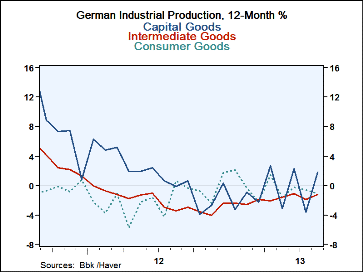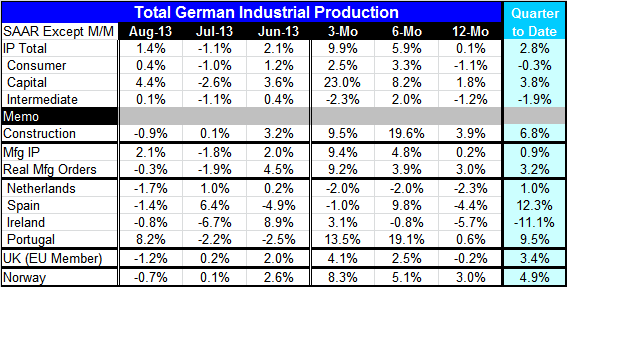 Global| Oct 09 2013
Global| Oct 09 2013German IP Rises as EMU-wide IP Stirs
Summary
German industrial production rose by 1.4% in August after falling by 1.1% in July. All three-major sectors reversed declines in July to advance in August. In the quarter-to-date, German IP is rising at a 2.8% annual rate, led by a [...]
 German industrial production rose by 1.4% in August after falling by 1.1% in July. All three-major sectors reversed declines in July to advance in August.
German industrial production rose by 1.4% in August after falling by 1.1% in July. All three-major sectors reversed declines in July to advance in August.
In the quarter-to-date, German IP is rising at a 2.8% annual rate, led by a strong advance in capital goods which offsets declines in consumer goods output and intermediate goods output. The sequential growth rates show improvement from 12- to 6- to 3-months for capital goods. For intermediate and consumer goods the improving sequential trend breaks off for three-months. Germany's improving trend is being carried by its capital goods sector.
The chart above, that describes the pattern in the year-over-year growth rates for these sectors, shows a very choppy pattern for capital goods; this month marks an upswing. For intermediate goods the annual growth rates are getting progressive larger although they still are negative. For consumer good output, there was an improvement early in 2013, but since then consumer goods output trends have been skimming just below zero, posting a steady diet of small declines ever since.
For other EMU and EU members that have reported early IP results, we see that the quarter-to-date output trends are up for five of the six early reporters.
However, trends are more equivocal. Ireland, the UK and Norway show steady accelerations from in their growth rates over shorter spans: 12 months to 6-months to 3-months. Portugal shows sharp improvement of its 3-month and 6-month rates compared to its year-over-year rate. Spain and the Netherlands show recent faltering.
Germany's growth progress is solid in terms of its reported growth rates, but not shared by all sectors. It may rely a bit too much on capital goods. That sector's strength will not endure if the rest of the eurozone falters. The UK result is quite good and its improvement is widespread. The NISER (National Institute of Economic and Social Research) holds that the UK recession is over but it looks for output to remain below its peak for some time. The rest of Europe is still struggling and we continue to mark its progress month by month - and still with a degree of skepticism.

Robert Brusca
AuthorMore in Author Profile »Robert A. Brusca is Chief Economist of Fact and Opinion Economics, a consulting firm he founded in Manhattan. He has been an economist on Wall Street for over 25 years. He has visited central banking and large institutional clients in over 30 countries in his career as an economist. Mr. Brusca was a Divisional Research Chief at the Federal Reserve Bank of NY (Chief of the International Financial markets Division), a Fed Watcher at Irving Trust and Chief Economist at Nikko Securities International. He is widely quoted and appears in various media. Mr. Brusca holds an MA and Ph.D. in economics from Michigan State University and a BA in Economics from the University of Michigan. His research pursues his strong interests in non aligned policy economics as well as international economics. FAO Economics’ research targets investors to assist them in making better investment decisions in stocks, bonds and in a variety of international assets. The company does not manage money and has no conflicts in giving economic advice.
More Economy in Brief
 Global| Feb 05 2026
Global| Feb 05 2026Charts of the Week: Balanced Policy, Resilient Data and AI Narratives
by:Andrew Cates






